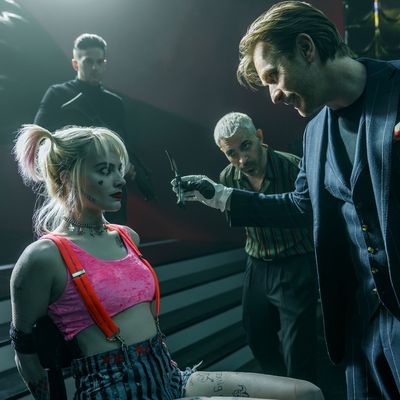
This review originally ran in February. We are republishing it on the occasion of the film’s digital release.
How do you solve a problem like Dr. Harleen Quinzel? Harley Quinn, Arkham psychiatrist turned lover/accomplice to the Joker and all-around problematic fave, has gone through various iterations in her multi-platform existence, from smothering comedic sidekick to abused sex bomb to unbalanced anti-heroine in her own, not always coherent, right. Now she’s the center of a big-screen outing, sort of — Birds of Prey, another getting-the-team-together affair whose actual intentions are signaled by its optional subtitle, And the Fantabulous Emancipation of One Harley Quinn. Birds of Prey attempts to pry Harley away from the dysfunctional relationship that has defined her and let her fly free with her own sparkle- and shattered-limb-filled adventure. If the results are mixed, it’s because the movie devotes more thought to putting distance between itself and Suicide Squad than to imagining what an independent version of the character is actually like. “A harlequin’s nothing without a master,” Harley declares morosely while out drowning the dregs of her recently ended romance in booze. And while she’s wrong — she’s definitely something — the movie never feels entirely decided on what that is.
One thing Harley is not is a natural member of the girl-power battalion. The most interesting thing about Birds of Prey — technically the eighth film in the DC Extended Universe, not that they really seem to be bothering much with that concept at the moment — is how it strives to carve out a distinctively feminine (and far less brooding) sensibility while also skewing dark. Birds of Prey was written by Christina Hodson and directed by Cathy Yan (Dead Pigs), who has a taste for speed-ramped action set pieces, and it can be startlingly gorgeous, as when Harley plows through an inexplicably unarmed police station with a gun that shoots bean bags and glitter. But it never settles on how fucked-up it wants its fucked-up protagonist to be. The film is a hard R, mostly due to violence as well as language and the fact that Harley powers up for a fight by happily, if accidentally, indulging in some blow. But you can feel the feverish stress of the calculus it is constantly performing with regard to morality and, maybe more important, likability. It’s why Harley opts for nonlethal force when dealing with the cops who are after her but nonchalantly shoots a biker assailant in the head.
It’s also why the plot of the movie, such as it is, revolves around the tried-and-tested approach of saddling a supposedly uncaring character with a kid. Ella Jay Basco, as foster kid/pickpocket/MacGuffin-keeper Cassandra Cain, is at least a gratifyingly uncutesy presence, even if the pattern of Harley’s softening to her, betraying her, and finally coming to her rescue is entirely familiar. The other major players in the story — Gotham detective Renee Montoya (Rosie Perez); vengeful mob daughter Helena Bertinelli (Mary Elizabeth Winstead), a.k.a. the Huntress; and superpowered singer Dinah Lance (Jurnee Smollett-Bell), a.k.a. Black Canary — remain in their own narrative lanes until late in the movie. Perez is fine, Winstead is unexpectedly funny as a crossbow-wielding tough, and Smollett-Bell gets a triumphant moment that brings to mind Kung Fu Hustle. As resentful rich-kid villain Roman Sionis, Ewan McGregor gives a goofily malevolent zing to his line readings and maintains a memorably codependent, vaguely homoerotic relationship with his sadistic underling Victor Zsasz (a bleached-blond Chris Messina).
But this is Harley’s story, in all of its strengths and weaknesses. Robbie wisely leans into the cartoonish aspects of the character, and Yan lets her voice-over yank the timeline out of order and splashes graphics on the screen to accompany her more exaggerated affect. (One effect of Birds of Prey wandering away from the glum tone of Suicide Squad is that it ends up being reminiscent of Deadpool, as though those are the two poles of comic-book edginess.) This iteration of Harley tends to drop psychological analysis more often, a reminder that this character, who is often whittled down to a symbol of irrational, masochistic love, also had a whole buttoned-down life she burned down in order to embrace chaos. It’d be nice if there were more of that, if the film’s interest in her interiority went deeper than just her need to go solo. This Harley doesn’t feel like the grim fetish object she verged on in her previous big-screen outing — not because she looks different but because she’s shot so differently, the camera no longer lasciviously panning down her body. It’s a welcome development in a film that’s never, otherwise, as radical as it feels it should be, hedging its bets with regard to the audience it appears to want and the one it seems to assume it’ll have. Then she rides off into the sunset, Harley Quinn, ready to be rebooted again by James Gunn in 2021, this character too beloved to be abandoned and too confounding to be solved.


